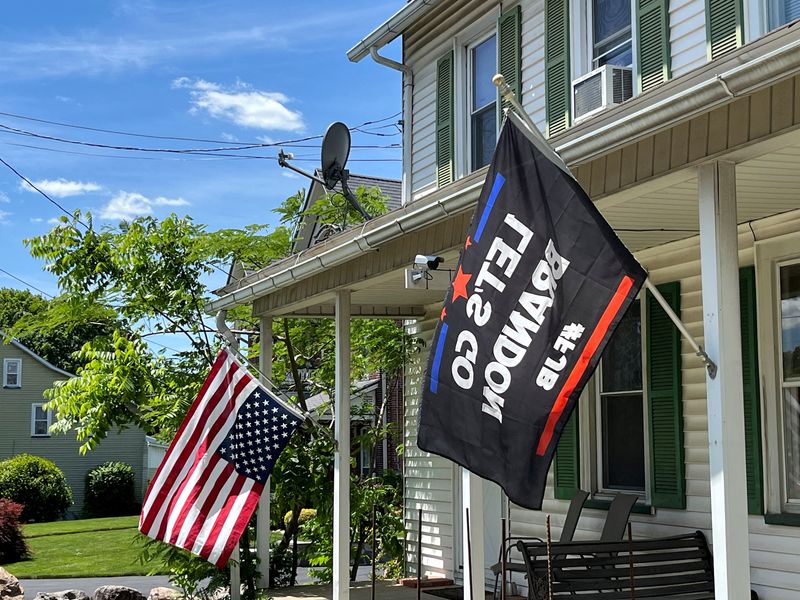Trump supporters turn US flags upside down to protest guilty verdict
2024.05.31 16:23
By Tim Reid, Alexandra Ulmer and Helen Coster
WASHINGTON (Reuters) – Upside-down American flags emerged outside homes and on social media on Friday in support of Donald Trump after a New York jury returned a historic guilty verdict against the former Republican president.
Republican Representative Marjorie Taylor Greene and country music singer Jason Aldean were among the prominent Americans to display the inverted flag, a symbol of distress or protest in America for over 200 years.
The symbol, popular among some avid Trump supporters since his 2020 election defeat, exploded across pro-Trump social media accounts after he was convicted on Thursday of falsifying documents to cover up a hush money payment to a porn star to illegally influence the 2016 election.
Minutes after the verdict Greene, a Trump loyalist, posted an inverted U.S. flag on her X account. By Friday afternoon more than 8 million people had viewed it.
Aldean posted an inverted flag on his Instagram account, saying: “Scary times in our country right now, man.” He added: “If there was ever a time to speak up, ITS NOW! Make no mistake. We are in trouble.”
Don Tapia, a former Trump ambassador to Jamaica and a Republican donor, flew an inverted flag outside his Arizona home. He said he had received phone calls of support and that motorists had honked as they drove by. “Will switch back Sunday to regular flag,” he told Reuters by text message.
Dan Bongino, a conservative radio talk show host who interviewed Trump on his show on Wednesday, posted an inverted U.S. flag on his X account after the verdict. It had received 250,000 views by mid-afternoon on Friday.
A Miami chapter of the Proud Boys, a far-right militant group, posted an inverted flag on the message channel Telegram, as did a similar group called Patriot Voice, with the words: “In dire distress.”
On pro-Trump corners of the internet, some supporters called for riots, revolution and violent retribution.
The symbolic inverting of the flag drew nationwide attention when the New York Times reported in mid-May that an upside-down Stars and Stripes was flown outside the home of U.S. Supreme Court Justice Samuel Alito in the weeks after the Jan. 6, 2021, assault on the U.S. Capitol by Trump supporters rioting in protest at his 2020 election defeat.
Alito, a conservative appointed to the court by Republican former President George W. Bush, told the Times he had “no involvement whatsoever in the flying of the flag.” He said his wife raised the inverted flag over a neighborhood dispute.
Trump, the first former president to be convicted of a crime, said on Friday he will appeal the verdict. He is locked in a tight race with Democratic President Joe Biden ahead of their Nov. 5 election rematch.
An upside-down U.S. flag was first used by sailors in the 1700s to signal distress, said presidential historian Timothy Naftali. It has since taken on a long history of political symbolism on the American left as well as the right.
It was used in the anti-slavery movement in the mid-1800s and was carried by anti-Vietnam War protesters in the 1960s, said Naftali, a professor at Columbia University’s School of International and Public Affairs.
He said it was ironic that when Vietnam War protesters inverted the flag or burned it, Republicans generally decried that.
“We live in an era now where the deepest and most virulent conspiracies about the nature of our Constitution are on the right. Inverting the flag is part of that,” he said.
An inverted U.S. flag was flown by some people protesting the murder of George Floyd, a Black man, by a white Minnesota police officer in 2020.

It was carried by people protesting the U.S. Supreme Court decision in 2022 to end the federal right to an abortion.
Trump and his Republican supporters have in recent years decried Black football players taking a knee during the playing of the U.S. national anthem, known as the Star-Spangled Banner (NASDAQ:), itself a reference to the flag.








